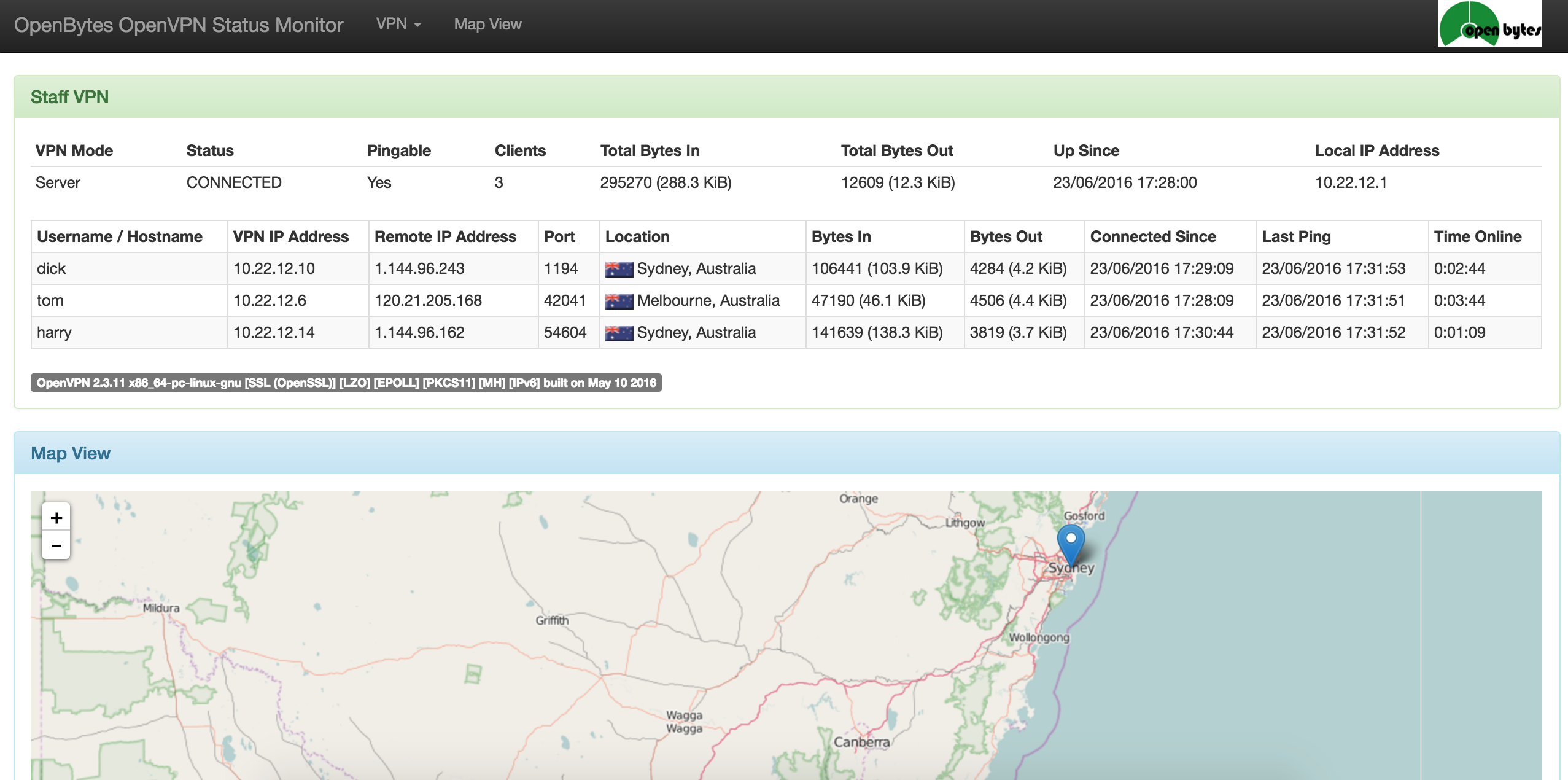- change iplockup/whois ✅
- add simple login
- add user history
openvpn-monitor is a simple python program to generate html that displays the status of an OpenVPN server, including all current connections. It uses the OpenVPN management console. It typically runs on the same host as the OpenVPN server, however it does not necessarily need to.
- Ubuntu 20.04 LTS (focal)
- Debian 10 (buster)
- CentOS/RHEL 8
The current source code is available on github:
https://github.com/furlongm/openvpn-monitor
N.B. all CentOS/RHEL instructions assume the EPEL repository has been installed:
dnf -y install epel-release
If selinux is enabled the following changes are required for host/port to work:
dnf -y install policycoreutils-python-utils
semanage port -a -t openvpn_port_t -p tcp 5555
setsebool -P httpd_can_network_connect=1
# apt -y install python3-virtualenv geoip-database geoip-database-extra # (debian/ubuntu)
# dnf -y install python3-virtualenv geolite2-city # (centos/rhel)
mkdir /srv/openvpn-monitor
cd /srv/openvpn-monitor
virtualenv -p python3 .
. bin/activate
pip install openvpn-monitor gunicorn
gunicorn openvpn-monitor -b 0.0.0.0:80See configuration for details on configuring openvpn-monitor.
apt -y install git apache2 libapache2-mod-wsgi python3-geoip2 python3-humanize python3-bottle python3-semantic-version geoip-database geoip-database-extra
echo "WSGIScriptAlias /openvpn-monitor /var/www/html/openvpn-monitor/openvpn-monitor.py" > /etc/apache2/conf-available/openvpn-monitor.conf
a2enconf openvpn-monitor
systemctl restart apache2dnf -y install git httpd mod_wsgi python3-geoip2 python3-humanize python3-bottle python3-semantic_version geolite2-city
echo "WSGIScriptAlias /openvpn-monitor /var/www/html/openvpn-monitor/openvpn-monitor.py" > /etc/httpd/conf.d/openvpn-monitor.conf
systemctl restart httpdcd /var/www/html
git clone https://github.com/furlongm/openvpn-monitor.gitSee configuration for details on configuring openvpn-monitor.
docker run -p 80:80 ruimarinho/openvpn-monitorRead the docker installation instructions for details on how to generate a dynamic configuration using only environment variables.
# apt -y install git gcc nginx uwsgi uwsgi-plugin-python3 virtualenv python3-dev libgeoip-dev geoip-database geoip-database-extra # (debian/ubuntu)
# dnf -y install git gcc nginx uwsgi uwsgi-plugin-python3 virtualenv python3-devel geoip-devel geolite2-city # (centos/rhel)cd /srv
git clone https://github.com/furlongm/openvpn-monitor.git
cd openvpn-monitor
virtualenv -p python3 .
. bin/activate
pip install -r requirements.txtCreate a uWSGI config: /etc/uwsgi/apps-available/openvpn-monitor.ini
[uwsgi]
base = /srv
project = openvpn-monitor
logto = /var/log/uwsgi/app/%(project).log
plugins = python3
chdir = %(base)/%(project)
virtualenv = %(chdir)
module = openvpn-monitor:application
manage-script-name = true
mount=/openvpn-monitor=openvpn-monitor.py
Create an Nginx config: /etc/nginx/sites-available/openvpn-monitor
server {
listen 80;
location /openvpn-monitor/ {
uwsgi_pass unix:///run/uwsgi/app/openvpn-monitor/socket;
include uwsgi_params;
}
}
ln -s /etc/uwsgi/apps-available/openvpn-monitor.ini /etc/uwsgi/apps-enabled/
systemctl restart uwsgi
ln -s /etc/nginx/sites-available/openvpn-monitor /etc/nginx/sites-enabled/
rm /etc/nginx/sites-enabled/default
systemctl restart nginxSee configuration for details on configuring openvpn-monitor.
TBDAdd the following line to your OpenVPN server configuration to run the management console on 127.0.0.1 port 5555, with the management password in /etc/openvpn/pw-file:
management 127.0.0.1 5555 pw-file
To run the management console on a socket, with the management password in /etc/openvpn/pw-file:
management socket-name unix pw-file
Refer to the OpenVPN documentation for further information on how to secure access to the management interface.
Copy the example configuration file openvpn-monitor.conf.example to the same
directory as openvpn-monitor.py.
cp openvpn-monitor.conf.example openvpn-monitor.conf
In this file you can set site name, add a logo, set the default map location (latitude and longitude). If not set, the default location is New York, USA.
Once configured, navigate to http://myipaddress/openvpn-monitor/
Note the trailing slash, the images may not appear without it.
openvpn-monitor can be run from the command line in order to test if the html generates correctly:
cd /var/www/html/openvpn-monitor
python3 openvpn-monitor.pyFurther debugging can be enabled by specifying the --debug flag:
cd /var/www/html/openvpn-monitor
python3 openvpn-monitor.py -dopenvpn-monitor is licensed under the GPLv3, a copy of which can be found in the COPYING file.
Flags are created by Matthias Slovig (flags@slovig.de) and are licensed under Creative Commons License Deed Attribution-ShareAlike 3.0 Unported (CC BY-SA 3.0). See http://flags.blogpotato.de/ for more details.
